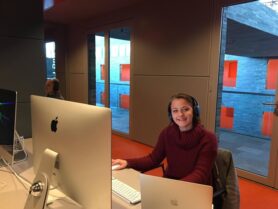Uncategorized
Sophie Wouters
Envisioning the Climate
Sophie Wouters – Research Seminar 2022-2023

Sophie Wouters at work in the Instituut voor Beeld en Geluid, the largest audio-visual archive in the Netherlands.
The climate crisis is no longer something of the future, all over the world, people are already experiencing its implications. The Saudi desert is turning green, the summer of 2022 was the hottest on record in Europe and different countries, like the US and Australia, are increasingly facing wildfires. While researchers are trying very hard to find out what we can do to change the direction in which the world is going, it is also important to look back and find out how the proposed problems and solutions have changed over time. This is relevant because the way in which the environment, climate change, and our role as citizens and consumers were framed in the past can show us how the ideas that we have now were formed.
With this in mind, I spent the last couple of weeks in the archive of Beeld & Geluid (The Dutch institute of Sound & Vision) in Hilversum, to look at public awareness campaigns made by the government organisation Postbus 51 between 1968 and 2000. I wanted to find out how the Dutch government framed environmental issues and the role of consumers in their approach to solve environmental problems.
In the archive I found around a hundred relevant videos with various solutions, from closing your curtains to buying sustainable products. What struck me most was the connections that were sometimes made between very big and global problems, like the greenhouse effect, and very small and personal solutions, like turning off the bathroom light or buying a different kind of paper.
This idea of ‘a little goes a long way’, is often made very explicit when the camera quickly zooms out from someone in their own home, to the whole globe, hanging in space. These visuals have always looked very natural to me, because I grew up with the image of the earth as a representation for being green, and the idea that if you just shower five minutes less, the world will not get any hotter.
Now that I have looked at these images a little longer and a bit more critically, I realise how naïve these thoughts were. Of course, you should try and do as much as you can, but I think by now it has become clear that using an energy-saving bulb is not going to save the world. If a better environment does indeed start with us, maybe it starts with us being more critical of the ideas about sustainability that we have in our heads.

